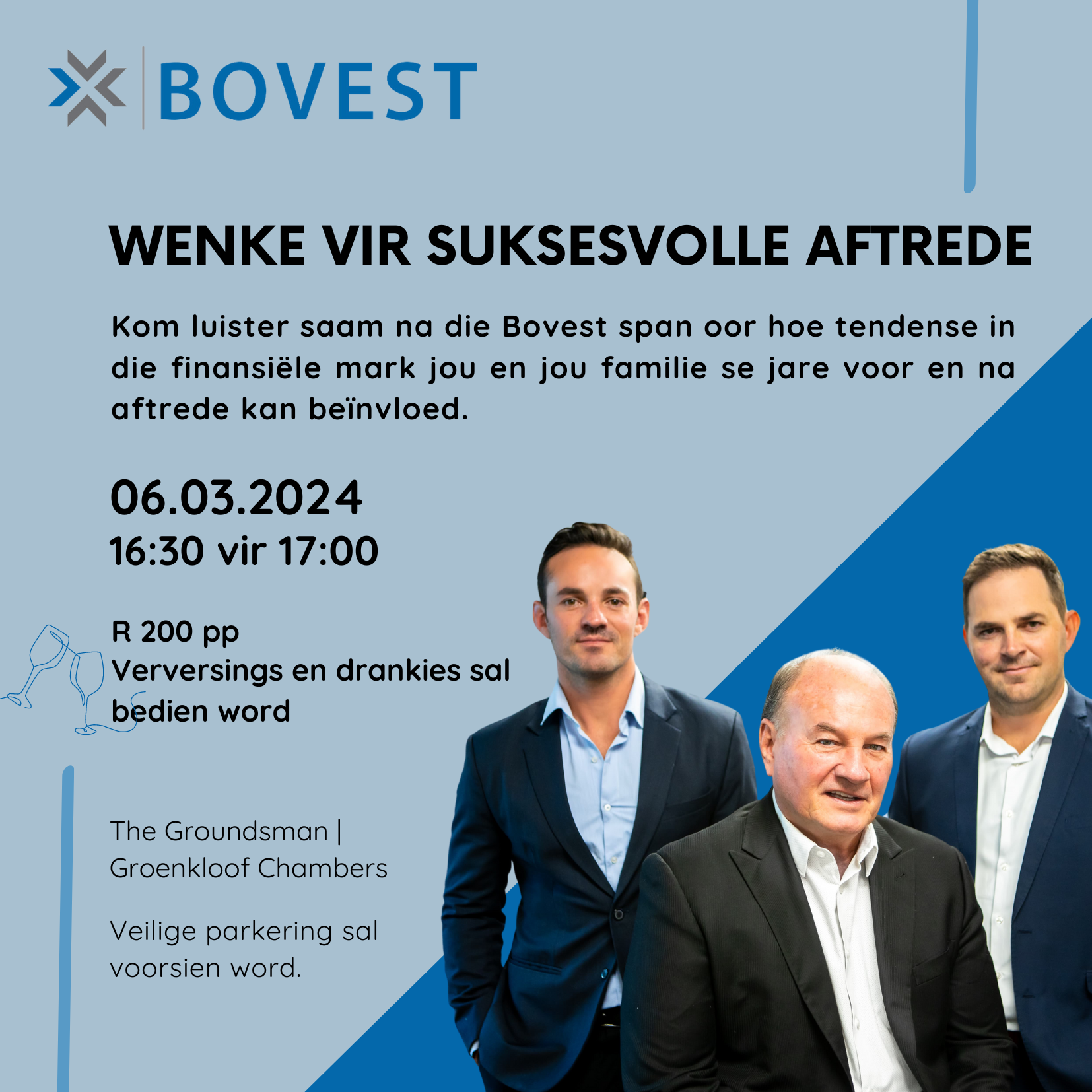Blogs
Read our latest news and industry insights.
Estate Planning

The below is a basic scenario I recently worked on for a client. The individual had around R7mil in the specific Retirement Annuity and needed R55k per month after tax as income from it. One of his concerns was if he should take the 1/3 lump sum allowed or if he should reinvest his entire retirement savings in a post-retirement structure. The below looks at these two scenarios. There are many complexities around structures, disallowed contributions, asset allocation and income percentages that are ignored and simplified in this example. Scenario 1: Invest full retirement savings in post-retirement product. First year income: R77 000 (R924 000 annually) After tax: R55 062 (R660 744 annually) Monthly tax payable: R21 938 Scenario 2: Take R900 000 in cash and reinvest in flexible investment. Lump sum after tax: R825 300 Voluntary income from lumpsum : R10 000 (R120 000 annually, no income tax on withdrawal) Retirement Lump Sum tax table:

Many South African investors choose to invest directly offshore by physically moving capital offshore through their annual allowances (R10 million foreign capital allowance and a R1 million single discretionary allowance). This is done for diversification or financial planning needs and can be full of pitfalls. One of these risks in offshore investing is probate. Offshore probate refers to the process of applying for the right to deal with a deceased investor’s foreign assets and proving their will as a valid legal document in the foreign jurisdiction. There are legislative differences in all jurisdictions and will most certainly provide complications on the investor’s death. Effectively there would be a deceased estate in the foreign jurisdiction and in South Africa. This could also imply that executor’s fees would apply in South Africa and the equivalent thereof in the offshore jurisdiction where it may not be as regulated and capped as in South Africa. If probate applies in the jurisdiction, the investor will need a will that will be legally considered in that jurisdiction and specifically mentions and gives instruction on the proceeds of the assets. This can typically make the already longwinded process even longer and leave dependents without access to assets. How can you avoid probate? Here are two options: Use an open-ended structure where the foreign assets are held by a local nominee company. Use a “wrapped” structure like a sinking fund or endowment policy where beneficiaries can be nominated. There are major differences between these two structures regarding tax and liquidity, making it very important to do effective financial planning around these variables. These structures are carefully designed with the specific jurisdictions in mind. If the requirements are met as set out by the product rules, the risk of probate may not apply. Importantly these structures provide a clear course of action on death and may give dependents access to capital if needed. This does not serve as financial advice* Ruvan J Grobler RFP™

Buy-and-sell agreements. Protecting your business interests. If you’re running a business with partners, having a buy-and-sell agreement in place is crucial. But why, you may ask? The answer is pretty straightforward. Here’s the deal: When you pass away, your shares in the company become part of your estate or transfer to your business partner as per your shareholder’s agreement. If there’s no clear plan in place, those shares end up in your estate, to be distributed according to your will. Enter the buy-and-sell agreement – your solution to these issues. This agreement is backed by life insurance policies on each partner’s life, ensuring enough cash to cover the purchase price. Simultaneously, the agreement establishes the obligation to sell the deceased partner’s shares and the obligation for the surviving partner to buy them. Now, let’s talk about the risks: Insufficient cash: The remaining owners might not have enough cash to buy the deceased partner’s business interests. Uncertain fair price: Heirs might not be guaranteed a fair price for the business interests, potentially leading to a forced sale. Ownership complications: The remaining owners might face unclear ownership, dealing with heirs or delays in estate settlement. Business capital drain: Funding the purchase could drain the business’s capital, jeopardizing its continuity. On the flip side, the benefits are significant: Business continuity: The business keeps going without outside interference. Smooth transition: Funds are available for a timely conclusion of the transaction. For dependents or beneficiaries, the advantages are: Inherited capital: They receive a capital amount instead of dealing with a business they may not know. Financial security: The received capital can replace lost income and contribute to overall estate planning. Now, let’s consider the importance of a shareholder’s agreement: This agreement, entered into during the partners’ lifetimes, governs their relationship and outlines what happens to shares in the event of death or retirement. Without it, shares become part of the deceased partner’s estate. And remember, getting the structure right is essential to qualifying for estate duty exemption. The Estate Duty Act provides exemptions if specific conditions are met. In conclusion, a buy-and-sell agreement is vital for protecting interests and ensuring the intended transaction occurs. Without it, disputes can end in costly and time-consuming court battles, benefiting no one, especially not the deceased owner’s beneficiaries.



